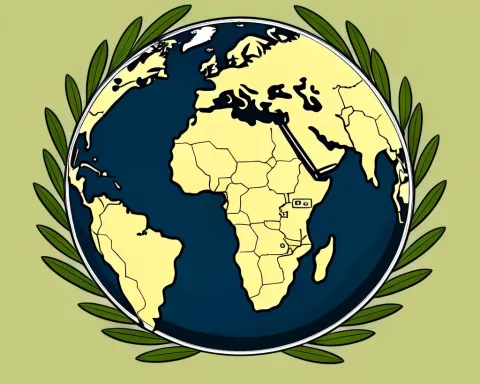The BRICS Tourism Ministers Meeting in Cape Town focused on creating a more robust, sustainable, and inclusive tourism sector through intra-BRICS tourism. High-ranking representatives from Brazil, Russia, India, and China worked together to encourage inclusive tourism growth by creating innovative travel packages, employing joint marketing tactics, and tackling barriers impeding growth. The meeting emphasized the need for cooperation in critical areas such as sustainable policies and practices, eco-friendly business models, and reevaluating perceptions of tourism success.
What was the focus of the BRICS Tourism Ministers Meeting in Cape Town?
The BRICS Tourism Ministers Meeting in Cape Town focused on the urgent need for the tourism industry’s revival and the critical role of intra-BRICS tourism in creating a more robust, sustainable, and inclusive sector. The high-ranking representatives from Brazil, Russia, India, and China worked towards the common objective of defining clear steps to encourage inclusive tourism growth among their countries, such as creating innovative travel packages, employing joint marketing tactics, and tackling barriers impeding growth.
A Meeting of Tourism Leaders in Cape Town
On October 24, 2023, Minister Patricia de Lille presided over the BRICS Tourism Ministers Meeting in Cape Town, South Africa. This significant event was a follow-up to the successful BRICS Summit held earlier this year, which focused on the urgent need for the tourism industry’s revival and the critical role of intra-BRICS tourism in creating a more robust, sustainable, and inclusive sector.
The BRICS Tourism Ministers’ gathering in 2023 provided an opportunity for member nations to share information and experiences, fostering closer collaboration and agreement on crucial policy priorities for a well-rounded tourism revival. South Africa’s leadership of BRICS has encouraged dialogue among its members, building upon the achievements of previous leaders and furthering the goals of the BRICS Summits.
To maintain continuity and maximize the collective power of BRICS members, South Africa’s theme for leading BRICS Tourism in 2023 is “Sustainable and inclusive tourism recovery,” which is in line with the country’s overall leadership theme.
Strengthening Ties between BRICS Nations
High-ranking representatives from Brazil, Russia, India, and China participated in the meeting, all working towards the common objective of defining clear steps to encourage inclusive tourism growth among their countries. To accomplish this, the BRICS nations must create innovative travel packages, employ joint marketing tactics, and tackle barriers impeding growth.
Cooperation is vital for expanding air access and simplifying visa procedures between the BRICS countries, ensuring smooth travel. This year has already witnessed significant progress, with direct flights from Air China, Brazil’s LATAM airlines, and South African Airways (SAA) resuming operations. As President Cyril Ramaphosa stated at the BRICS Summit in August, enhanced investment and trade relations with other nations facilitate economic growth, generate opportunities for new enterprises, and decrease unemployment.
BRICS countries are crucial destinations for South Africa’s products and services, investment sources, and increasingly important tourism markets. The global tourism sector is bouncing back, with international tourist arrivals in the first seven months of 2023 reaching 84% of pre-pandemic levels, as reported by the United Nations World Tourism Organisation (UNWTO). South Africa’s tourism revival is well on track, with substantial growth in arrivals from BRICS countries.
Enhancing Tourism and Streamlining Visa Processes
From January to August 2023, South Africa experienced a 63.4% increase in arrivals compared to the same timeframe in 2022, totaling 5.5 million. Arrivals from Brazil, Russia, India, and China saw considerable percentage increases year over year. Although arrivals from Brazil, India, and China during the first eight months of 2023 remain lower than 2019 levels, direct flights are anticipated to support recovery from these crucial source markets in the following months.
Regarding visa regulations, visitors from Brazil and Russia are exempt from visas for up to 90 days, while China and India are part of South Africa’s e-visa system. Tourists from the BRICS bloc significantly contribute to South Africa’s economy through spending on transportation, lodging, leisure, and business activities.
The South Africa Department of Tourism is dedicated to expanding tourism between South Africa and the BRICS countries, concentrating on improving communication and collaboration, continuing marketing and promotional efforts, enhancing safety and security measures, and simplifying visa-related procedures for easy access.
Commitment to Sustainable and Inclusive Tourism Recovery
The BRICS Tourism Ministers Meeting concluded with a communiqué detailing the member nations’ dedication to sustainable and inclusive tourism recovery, acknowledging the extensive impact of the COVID-19 pandemic. Cooperation in critical areas such as integrating sustainable policies and practices, devising more eco-friendly tourism business models, and reevaluating perceptions of tourism success is essential for achieving these objectives.
In summary, the BRICS Tourism Ministers Meeting in Cape Town has paved the way for cultivating a more resilient, sustainable, and inclusive tourism sector among its member nations. Through joint efforts and collaboration, the BRICS countries can tap into the potential of intra-BRICS tourism, contributing to regional and global economic recovery and social development.
1. What was the focus of the BRICS Tourism Ministers Meeting in Cape Town?
The BRICS Tourism Ministers Meeting in Cape Town focused on the urgent need for the tourism industry’s revival and the critical role of intra-BRICS tourism in creating a more robust, sustainable, and inclusive sector.
2. What is the BRICS bloc?
The BRICS bloc is a group of five major emerging economies: Brazil, Russia, India, China, and South Africa.
3. What steps did the BRICS nations agree to take to encourage inclusive tourism growth?
To encourage inclusive tourism growth, the BRICS nations agreed to create innovative travel packages, employ joint marketing tactics, and tackle barriers impeding growth.
4. What is the theme for South Africa’s leadership of BRICS Tourism in 2023?
The theme for South Africa’s leadership of BRICS Tourism in 2023 is “Sustainable and inclusive tourism recovery.”
5. How are BRICS countries crucial destinations for South Africa?
BRICS countries are crucial destinations for South Africa’s products and services, investment sources, and increasingly important tourism markets.
6. What is the current status of international tourist arrivals?
International tourist arrivals in the first seven months of 2023 reached 84% of pre-pandemic levels, as reported by the United Nations World Tourism Organisation (UNWTO).
7. How is South Africa committed to expanding tourism between South Africa and the BRICS countries?
The South Africa Department of Tourism is dedicated to expanding tourism between South Africa and the BRICS countries, concentrating on improving communication and collaboration, continuing marketing and promotional efforts, enhancing safety and security measures, and simplifying visa-related procedures for easy access.
8. What was the conclusion of the BRICS Tourism Ministers Meeting in Cape Town?
The BRICS Tourism Ministers Meeting concluded with a communiqué detailing the member nations’ dedication to sustainable and inclusive tourism recovery, acknowledging the extensive impact of the COVID-19 pandemic. Cooperation in critical areas such as integrating sustainable policies and practices, devising more eco-friendly tourism business models, and reevaluating perceptions of tourism success is essential for achieving these objectives.












